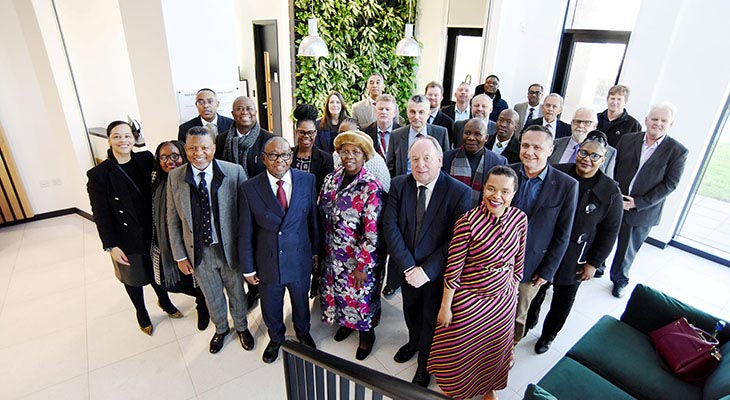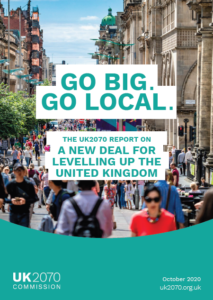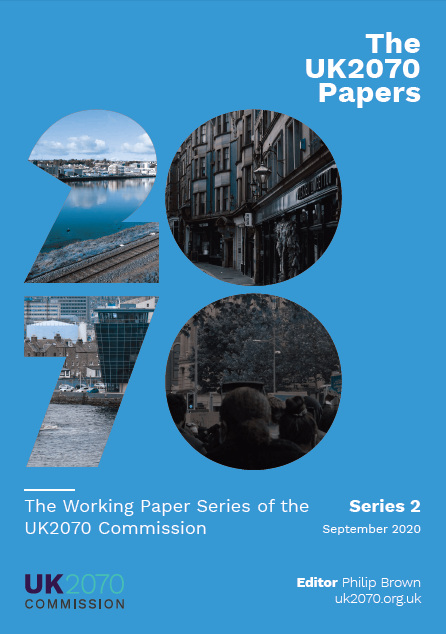South Africa Minister and Department for Science and Innovation Delegation visiting the Net Zero Industry Innovation Centre, Teesside Hosted by UK2070 Commission

Led by South African Minister for Higher Education, Science and Technology, Dr Blade Nzimande, the delegation visited the Tees Valley to learn how the University’s Net Zero Industry Innovation Centre (NZIIC) is helping to support the region’s ambition of becoming the first and largest decarbonised industrial cluster by 2040.
The £13.1m facility, which opened for business earlier this year, is a national centre of excellence for net zero technologies and is already helping position the Tees Valley firmly at the heart of the UK’s green industrial revolution.
The visit was organised by the UK2070 Commission, an independent inquiry into city and regional inequalities in the UK and led by UK2070 Commissioner and Teesside Taskforce Chair, Professor Michael Henson.
Industry partners including representatives from global companies Turner & Townsend and bp joined the delegation. As part of the programme, the visitors were shown how the University is supporting the growth of innovative new businesses which are finding solutions to address the climate emergency and had the opportunity to talk with representatives from SeerBi,Stuff4Life and XHeat.
The NZIIC’s work to create a circular economy was demonstrated by its collaboration with Stuff4Life, a start-up business that is finding a use for end-of-life workwear which would otherwise have ended up in landfill.
Professor Stephen Cummings, Pro Vice-Chancellor (Research and Innovation), said:
“We were delighted to welcome our guests from South Africa and to showcase how Teesside University is fulfilling its role as an anchor institution for the Tees Valley by driving forward innovation and investment in green technologies. Since opening this year, the NZIIC has had a demonstrable impact on green innovation in the region. We were very pleased to show how industry and academic collaboration is reaping dividends and helping position this region as a hub for green and sustainable growth.”
Gari Harris, Director of the NZIIC
“A key part of our mission is to support the just transition to a net zero economy and we look forward to sharing knowledge and cooperating further to support our communities to achieve this goal.”
Gari Harris, Director of the NZIIC, added: “Since opening this year, the NZIIC has had a demonstrable impact on green innovation in the region.
“We were very pleased to show how industry and academic collaboration is reaping dividends and helping position this region as a hub for green and sustainable growth.”
Through the UK20270 Teesside Taskforce, Teesside University has already established strong links and hosted previous visits with South African officials and has signed a collaboration agreement with South Africa’s Stellenbosch and Pretoria Universities deepening UK-South African academic collaboration on hydrogen.
Professor Michael Henson, UK2070 Commissioner, said:
“Over the last year I have had the pleasure of leading the UK2070 Commission’s South Africa/UK partnership programme championing the role of the Tees Valley and Teesside University in green industries. The programme has included several missions to the UK and a visit to South Africa with Teesside University colleagues.
“As Commissioner, I was delighted to welcome the South African Minister for Higher Education, Science and Technology, Dr Blade Nzimande and his team back to Teesside for a second visit. We look forward to building on this latest visit and identifying further areas for collaboration.”
See previous press release – Trade Mission 5-Presidential Climate Commission:
Building on international collaboration between South Africa and Teesside University
Dr Crispian Olver Executive Director of the Presidential Climate Commission established by the President of the Republic of South Africa





 The Right Honourable The Lord Kerslake
The Right Honourable The Lord Kerslake
